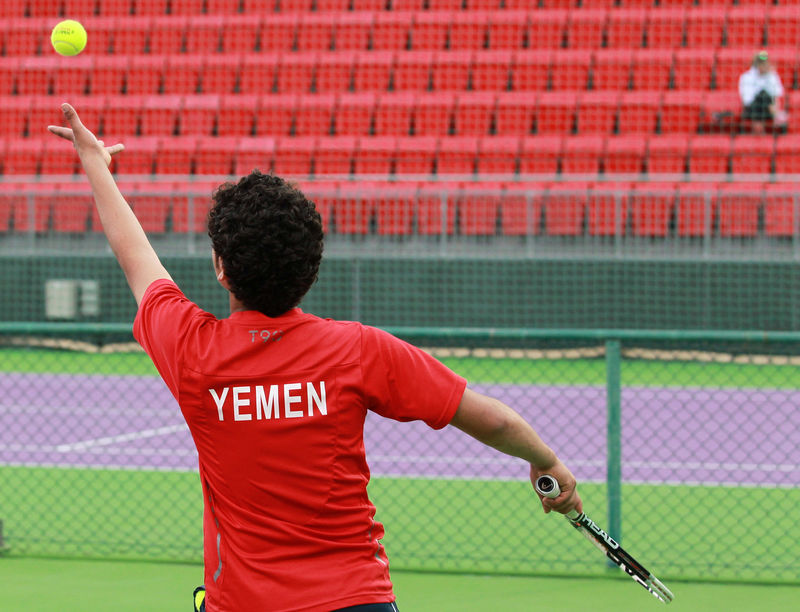By Tom Finn
DOHA (Reuters) - Stepping onto a floodlit tennis court in Qatar last week, 13-year-old Alhassan Ishaq tried to steady his nerves.
The aspiring tennis champion from Yemen had trained for months and used his family's savings crossing a war zone to reach the Asia junior championships in Qatar.
Justifying the arduous trip, he not only made it through the qualifying stage but pressed on to reach the last eight, lifting his ranking to 126th in Asia among under-14s.
Pictures of him competing in his blue t-shirt in Doha brightened the usually sombre pages of Yemeni newspapers - a rare note of cheer in a country ravaged by two years of war and threatened by famine.
The war between a Saudi-led alliance and the Shi'ite Houthi forces in control of the capital Sanaa has killed at least 10,000 people, including 1,500 children, according to the United Nations.
Countless others have been forced to go hungry or flee their homes; some are targeted for radicalisation by the Yemeni arm of al Qaeda. Youngsters aspiring to a career in sport have to overcome massive obstacles, including damage to training facilities from air strikes and shelling.
"The war can feel impossible to ignore but I have to concentrate. I just want to win matches," said a breathless Ishaq during a break from training.
"Honestly, I'm just trying to focus on the tennis."
Unable to fly to Qatar from Sanaa airport which was bombed in 2015, Ishaq and his coach, Osama al-Maqaleh, embarked on a 21-hour bus journey across Yemen's mine-strewn interior last month to an airport in the eastern city of Seyoun.
Passing burnt-out buildings and villages recently controlled by al Qaeda militants, their bus was held at checkpoints by Houthi fighters who interrogated passengers and searched among luggage for weapons.
"They asked people where they were from and inspected their hands to see if they had been using weapons," said Maqaleh. "One passenger was taken off the bus. He didn't get back on," he said.
"You should stay and fight!" a bearded Houthi fighter with a gun on his shoulder said to Ishaq before waving the bus on.
Leaving behind the mountains that lead to Sanaa, the bus crossed the war's frontline into Marib province, where Gulf Arab troops loyal to Yemen's exiled government have assembled military outposts in the desert.
SHRAPNEL ON COURT
The war has taken its toll on sport in Yemen.
Soccer stadiums in Abyan province and the central city of Ibb have been damaged in the fighting. In 2015, Yemen's national soccer team caught the world’s attention by crossing the Gulf of Aden on a cramped fishing boat to travel to a World Cup qualifying match.
When Saudi jets last year bombed a presidential palace complex close to Ishaq's club in Sanaa, shrapnel rained down on the courts.
"We found one piece, metal and charred, it was arm-length. It fell on the court," said Maqaleh.
Tennis in Yemen is tough at the best of times: power cuts and sandstorms often disrupt matches, and clubs with pot-holed courts lack full-time coaches and adequate funding from ministries.
Still, Ishaq and a handful of juniors, with support from the International Tennis Federation, have entered regional tournaments and hope to gain international rankings.
Their ambitions are threatened by a conflict in which close to a third of combatants are children, according to UNICEF, and hundreds of thousands of children face life-threatening malnutrition.
But rebuilding the country and defying its current disasters will require kids like Ishaq not to lose hope.

"Sometimes the bombing is so loud it rings in your ears and we have to evacuate the club," said Maqaleh. "But the next day the kids still want to play."